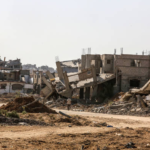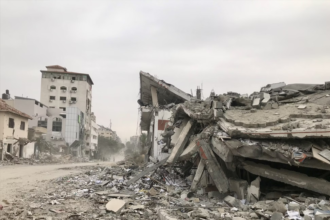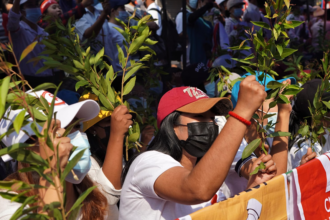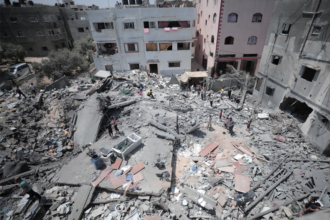A Fatal Encounter in the West Bank
Early dawn light of Tubas, a town in the Israeli-occupied West Bank, drew a white vehicle alongside the Palestine Customs Police station. For Abdel Nasser Sarhan, a uniformed cop just beginning his shift, 24-year-old, it appeared like any other day. His associates tell how the vehicle driver greeted Abdel Nasser in Arabic outside. Unaware of the approaching threat, CCTV footage shows him leisurely strolling by a security post with his gun thrown over his shoulder.
What Led to the Latest Surge in Gaza Aid Deaths?
A guy in jeans and a dark T-shirt appeared from the direction of the white van within seconds, closely followed by uniformed Israeli troops. The guy lifted a pistol without thinking twice and killed Abdel Nasser. Chaos followed as Israeli troops swiftly swept across the roadway. Every moment, they were caught on CCTV as they collected Abdel Nasser’s firearm and kept firing while his comrades tried to rescue his body.
The Aftermath and Evidence
That morning, the melancholy picture in Tubas was punctuated with a makeshift monument of stones and withering flowers where Abdel Nasser collapsed. Driven with bullet holes, each marked for documentation, the guard post and surrounding walls showed the marks of the occurrence. Haunted memories of the violence that had occurred came from fading bloodstains on the ground and the door.
The Israeli army issued a quick statement asserting the shooting took place during an operation meant to capture two wanted persons. Colleagues of Abdel Nasser said that these arrests happened in a neighboring residence. The army claimed that “a customs officer of the Palestinian Authority was killed during exchanges of fire” and that troops had “encountered armed terrorists.” The CCTV evidence, however, points otherwise and calls questions on the official narrative.
Two weeks later, an Israeli security officer speaking anonymously said that the event was “one of hundreds, if not thousands, of very precisely scheduled and executed special activities.” He said this was under review as it “didn’t go as planned.” With Abdel Nasser inadvertently caught in the crossfire of an undercover Israeli operation, the sad incident appears to have been a case of mistaken identification.
A Widening Rift
For Abdel Nasser’s colleagues in the customs police, this incident is more than simply a sad mishap; it’s a larger pattern of conduct that hinders their capacity to keep security in regions, not under direct Israeli military authority. “This calls a warning bell, particularly for us in the security services,” said Lt. Ibrahim Ayyash, Palestine Customs Police spokesperson. “How can we enforce law and order, deliver services to the people, and protect them if you’re impeding my job and killing my officers?”
Fearing they may come across disguised Israeli soldiers, the event has rendered customs officials more reluctant to stop dubious cars. “It now rests on you, as a customs officer, to determine whether to stop a vehicle,” Ayyash said. “You may be killed if you stop it, and it contains Special Forces [inside].”
Undercover Operations on the Rise
Long before the conflict in Gaza broke in October, undercover activities were a mainstay of West Bank life. Recent data suggests that the frequency of such surgeries has climbed. Multiple incidents of Israeli forces disguising themselves as civilians or even medics and kidnapping wanted Palestinians from hospital beds and city streets have been documented on CCTV.
These covert operations are a component of a more general struggle raging in the West Bank as the Israeli military targets armed groups allegedly financed by Iran. “The ground situation is very complicated,” one Israeli security officer said. You may argue that it is about to explode.
Beginning about 2021, a new breed of local armed groups—especially in the northern West Bank’s refugee camps—emerged; first, such nation arose in Jenin. From Tulkarem to Qalqilya and, most lately, Tubas, the continuing conflict in Gaza has stoked revolt in neighboring places. It was rising tension resulting from Israel’s security crackdown as well as from the conduct of militant Jewish settlers and the belief that the Palestinian Authority is unable to defend its people.
“They’re frustrated with Israel, they’re frustrated with the Palestinian Authority, and they’re looking for an outlet to this frustration,” the Israeli security officer added. The PA health ministry claims that between last October and now, around 600 Palestinians have died in the West Bank. According to the Palestinian Prisoners Society, 10,000 or so have been arrested. A UN count meanwhile shows that the West Bank has seen at least 17 Israeli deaths, including 12 security officers.
Fears of a New Intifada
Veteran watchers worry more and more that these violent conflicts may turn into a full-scale revolution or intifada. Former IDF Operations Division chief Gen. Israel Ziv said, “If it goes into an intifada, this is a much bigger problem.” “Militarily, we manage events either better or worse. But things change completely when it enters an intifada. And it could wind up there.
Gen. Ziv voiced alarm about the unwillingness to recognize the increasing risk much closer to home as the Israeli military remained intensely preoccupied with the battle in Gaza and its simmering struggle with Hezbollah along its northern border. He said, “It’s a huge problem that can blow up in our face in a more sensitive area, [close] to the centers of population in Israel.”
A Family in Grief
Abdel Nasser’s family is still in mourning over his sudden death at the Balata refugee camp on Nablus’ outskirts. Having seen the Tubas CCTV, they had formed their own opinions on the activities of the Israeli army. Said Abdel Nasser’s uncle, Ismail Mohammed Sarhan, his voice tinged with wrath and grief, “He came to kill, just to kill.”
The death of his son overwhelms Mohannad, Abdel Nasser’s father. He battled to find the words to explain what his son was like. His voice faltered as tears welled in his eyes. “Ambitious, kind, always smiling,” he murmured. The family’s loss is a moving reminder of the human cost of the continuing conflict, one that shows no signs of abating.








